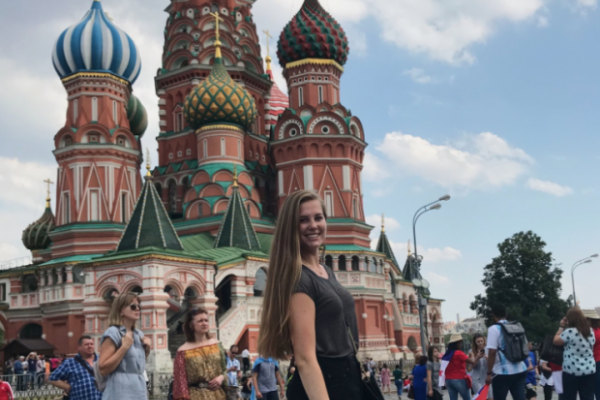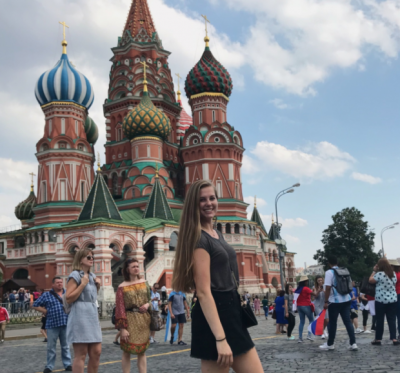COLUMN: Fulbright Dreams


Sydnee Wilke is a Russian and international studies major who has recently been awarded a U.S. Student Fulbright Grant to teach English in Russia during the 2020-21 academic year. The Center for Languages, Literatures and Cultures asked her to write what it means to her to receive the prestigious award.
I never thought my last month of senior year would play out like this.
I am holed up in my apartment in Columbus, finishing my Russian, Economics, and Contemporary Issues in the Middle East classes through Zoom and gearing up for my virtual graduation ceremony. As I prepare for life after Ohio State with a degree in Russian and International Studies, there is so much uncertainty about what happens next because of the COVID-19 pandemic.
I always hoped, but could never have imagined, that the next chapter of my academic journey would play out like this.
I was awarded a U.S. Student Fulbright Grant to teach English in Russia in the fall. It’s a once-in-a-lifetime opportunity to develop my fluency and spend time in a country I’ve grown to love. I was also accepted into the Eurasian, Russian and Eastern European Studies graduate program at Georgetown University’s Walsh School of Foreign Service, which will take me one step further to reaching my dreams of working for the U.S. Foreign Service.
And it all started with my decision to study Russian.
At my freshman orientation, when asked what language I would choose to study for my International Studies major, I chose Russian at the guidance of a thoughtful advisor. The language was hard, as it had a strange new alphabet, but there was much to appreciate about a language with so much history. In learning Russian, not only did I get to learn how to speak it, but I learned so much about the people and the culture. My professor would play Russian music and show us Russian cartoons while telling us stories from her childhood in Russia. She often encouraged us to explore Russia through food, music, television and film. These were the things that ultimately cultivated my love for Russia and its language.
As a sophomore, I did a virtual internship working with Russian students practicing English. Through this, I gained an insight into language learning and international education. I brought this experience with me the following summer to Moscow where I studied Russian and immersed myself in a new language and culture. My time abroad encouraged me to seek more opportunities working in Eastern Europe and I found myself in another virtual internship, this time working with EducationUSA Ukraine and advising students in Ukraine who aspired to attend colleges and universities in the United States.
I did not realize it then, but these experiences helped prepare me for the English Teaching Assistant (ETA) for the Fulbright program. The summer before my senior year, when I worked for two months at the State Department in Washington, D.C., I began my application to the Fulbright program. The Fulbright program is an amazing opportunity for students to spend a year abroad either researching or teaching English. I knew that I wanted to apply for the ETA position in Russia because of my love and interest in the country I had developed over the years. After all of my time working with Russians and living in Moscow, I wanted to return to give back to the people who gave so much to me during my time there.
After many interviews and months of waiting and amidst the coronavirus panic, I received good news: I had been chosen for a Fulbright. While this is an accomplishment to celebrate and enjoy, there are some concerns. The Fulbright program has persevered through many challenges over its 75-year history, but the current global situation is unprecedented. There is a lot of uncertainty about what will happen, if the program will be cancelled or postponed. Even if the program were to continue this year, what would happen in the face of another uptick in the pandemic? Would it be safe to live abroad for a year in a country or community where you are not certain about your health or the health of others? While celebrating a major achievement, I am cautious.
I try not to worry myself, however, with the unknowns. If the program happens this year and I am allowed to teach in Russia, I will be ecstatic. If it is cancelled or postponed, I will not fret. I can move forward with the graduate program at Georgetown University.
I am so glad that my experiences over the past four years have cultivated me into the person I am today. Without discovering Russia, its people, and its culture, I would not be set on my current path, one that hopefully leads me to my dream career working in the US Foreign Service. I hope to be a Public Diplomacy Officer at one of the U.S. embassies abroad. I would love to work daily with people from varied backgrounds as we share with one another our cultures and countries. For me, public service has always been a goal of mine and learning Russian has been one important step in helping me achieve that goal.
